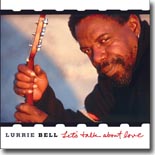|
Lurrie Bell
Let's Talk About Love
Aria B.G.
|

Let’s Talk About Love
(Aria B.G) is a personal triumph for Lurrie
Bell, who has experienced his share of adversity. In
2007, Bell lost both his partner, Susan Greenberg, and his
father, Chicago blues harmonica legend Carey Bell. It’s
not as if Lurrie hadn’t survived enough hardship. He
already had triumphed over a debilitating bout of mental
illness that stretched through much of the ’80s and ’90s,
during which he’d even gone homeless for a time. Through
it all, Bell took refuge in his music. In choosing the
edifying songs for this album, “A theme started to
emerge,” says producer Matthew Skoller, who chose all
the songs, “and that theme was love.” None of the 12
songs were written by Bell, but the conceptually
innovative blues stylist makes each one of them his own.
Bell is joined by several Chicago blues colleagues
including Felton Crews (bass), Kenny Smith (drums), and
Sidney Wingfield (keyboards). Billy Branch’s superb harp
appears on one track. Together, they comprise the city’s
upper echelon of blues artists. Lurrie’s bursting at the
seams full of feeling guitar style isn’t flashy. Nor is
it slashing or stinging, but it will leave its mark on
your soul. His earthy vocals are rough but tender.
The shuffling title track is modern day traditional
Chicago blues at its finest. Quite simply, the entire
46-minute disc could be described the same way. It may
not be one of his most often covered songs nor a classic
like Spoonful, but "Earthquake and Hurricane" is
undoubtedly Willie Dixon. Andrew Brown’s "You Ought To Be
Ashamed" isn’t the most memorable song, but each one of
Bell’s finger-plucked lead guitar notes sounds
wonderful. Hip Linkchain’s "Cold Chills" is a simple
boogie but Anthony Palmer’s potent rhythm guitar and
Bell’s intense lead guitar make it brilliant.
With a
shrill harp, Skoller raises a commotion on two songs.
"Turn To Me" is a slow minor key blues. Is there a better
kind? "Missing You" – written by another Chicago blues
guitar colleague Billy Flynn – can be interpreted as an
admirable farewell to Greenberg. The song is so sad,
it’s sweet. How Bell is capable of singing the loving
lyrics without breaking down is proof that he is a rock
of strength. At this time in his life, there likely
isn’t a more suitable song for Bell than Pop Staples’
"Why (Am I Treated So Bad)." Via affectionate vocals and
probing guitar, Bell expresses his pain. You’ll feel it
so much that you will hurt. But like a canker sore you
can’t resist touching, it’s a pleasure to experience.
Bell comes across musically mature on his triumphant
first solo release in eight years. You almost sense him
as a wounded veteran carrying the torch through the
homestretch so that it can be handed on to another
generation. As Skoller observes in his liner notes,
“Lurrie is now a blues master. There are very few blues
masters left.” He may not have the dynamism of Luther
Allison, but along with John Primer, Magic Slim, and Lil’
Ed Williams, Bell may be the last of the great Chicago
blues guitarists.
After listening to this real deal
blues CD, you’ll realize that Bell, like Chicago, is
loaded with the blues.
--- Tim
Holek
To say that 2007 was a
rough year for Lurrie Bell would be a major
understatement. Last January, Bell lost his companion
and soulmate, Susan Greenberg, to cancer. More than
anyone, Greenberg, who was also the mother of Aria,
Bell’s young daughter, helped him battle back from the
personal demons that threatened to derail his career and
kept him mostly inactive for nearly a decade between the
mid ’80s and mid ’90s. To make matters worse, Bell’s
father and mentor, harmonica player Carey Bell, died in
May of 2007 of heart failure.
It’s safe to say that many held their collective breath
wondering how Bell would respond to two such staggering
losses. He threw himself into his music, formed his own
label, Aria B. G. (named after his daughter), and
released Let’s Talk About Love, which has to be his most
personal release so far, no small feat for Bell, who
always poured a lot of himself into his recordings and
performances.
Consisting mostly of covers, Bell puts his own personal
tag on each of these tunes. Ray Agee’s title track is
spiced up with a lively arrangement and punctuated by
Bell’s always fiery and daring guitar work. Willie
Dixon’s underrated “Earthquake And Hurricane” gets an
update as well, and is one of many standout tunes.
“Feeling Good” is a nice, relaxed number featuring Bell
on acoustic guitar.
Guitarist Billy Flynn’s “Missing You” sounds
autobiographical as Bell delivers a heartfelt vocal
expressing his anguish and loss, and his performance on
Little Richard’s “Directly From My Heart To You,” both
vocally and on guitar is first-rate, as is a high-energy
take on Hip Linkchain’s “Cold Chills.” Another highlight
is a second Dixon cover, “Chicago Is Loaded With The
Blues,” a slow burner featuring plenty of Bell’s
powerful guitar, and the closer, Willie Williams’ “Wine
Head Woman,” a nice slice of good old Chicago Blues.
Joining Bell on the album are Sid Wingfield (piano),
Kenny Smith (drums), Anthony Palmer (rhythm guitar), and
Felton Crews (bass). Billy Branch plays harmonica on one
cut and co-producer Matthew Skoller plays on two others.
The production is excellent, and allows Bell plenty of
room to shine.
Based on Let’s Talk About Love, fans can breathe a sigh
of relief for Lurrie Bell. He’s still facing down the
demons of his past and has emerged from what had to be
one of the most difficult times in an already turbulent
life to release this stunning disc that captures the
real essence of the blues: love, loss, hope, despair,
fear, exuberance, and, most of all, joy.
--- Graham
Clarke